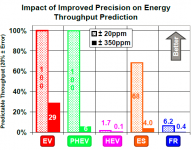Low Pressure Material-Based Natural Gas Fuel System

Technology Description:
ARPA-E and Ford Motor Company agreed to mutually conclude this project. Ford is developing an on-board adsorbed natural gas tank system with a high-surface-area framework material that would increase the energy density of compressed natural gas at low pressures. Traditional natural gas tanks attempt to compensate for low-energy-density and limited driving range by storing compressed gas at high pressures, requiring expensive pressure vessels. Ford and their project partners will optimize advanced porous material within a system to reduce the pressure of on-board tanks while delivering the customer expected driving range. This porous material allows more gas to be stored inside a tank by utilizing a surface energy attraction to the natural gas. These materials would be efficiently and cost-effectively integrated into a natural gas vehicle system that will promote and contribute to the widespread use of natural gas vehicles.
Potential Impact:
If successful, Ford’s low-pressure material-based natural gas fuel system would result in lowering the cost of on-board tanks station compressors, and fuel that serve to increase natural gas vehicle driving range.
Security:
Improving the convenience of natural gas vehicle ownership could reduce our dependence on foreign oil and make consumers less vulnerable to sudden oil price shocks.
Environment:
Natural gas vehicles produce approximately 10% less greenhouse gas emissions than gasoline-powered vehicles throughout the fuel life cycle.
Economy:
Compressed natural gas currently costs half as much per gallon of gasoline equivalent. With the average American spending over $2000 per year on gas, enabling the use of natural gas vehicles could save drivers $1000 per year.
Contact
ARPA-E Program Director:
Dr. Jason Rugolo
Project Contact:
Dr. Mike Veenstra
Press and General Inquiries Email:
ARPA-E-Comms@hq.doe.gov
Project Contact Email:
mveenstr@ford.com
Partners
Savannah River National Laboratory
University of California, Berkeley
BASF
Related Projects
Release Date:
02/22/2012
